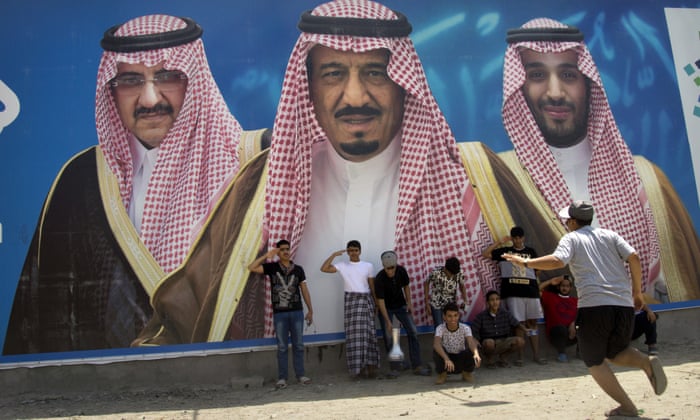A Brief Colonial History Of Ceylon(SriLanka)
Sri Lanka: One Island Two Nations
A Brief Colonial History Of Ceylon(SriLanka)
Sri Lanka: One Island Two Nations
(Full Story)
Search This Blog
Back to 500BC.
==========================
Thiranjala Weerasinghe sj.- One Island Two Nations
?????????????????????????????????????????????????Friday, June 30, 2017
Deposed Saudi crown prince confined to palace
Saudi officials deny claims Mohammed bin Nayef is under house arrest while power transition takes effect

Saudi
boys play in front of a billboard showing King Salman flanked by
Mohammed bin Salman (right) and Mohammed bin Nayef. Photograph: Amr
Nabil/AP

The deposed Saudi crown prince, Mohammed bin Nayef, has been confined to
his palace in the Red Sea city of Jeddah, as his young successor seeks
to consolidate his newfound power, two sources close to the royal family
have confirmed.
The movements of the former heir to the throne have been restricted since Mohammed bin Salman, 31, replaced his cousin as crown prince last week, ensuring that he, instead of the 57-year-old security tsar whom he ousted, would eventually succeed his father as ruler.
Senior Saudi officials denied Bin Nayef was under house arrest, with one
describing the claim – first reported in the New York Times – as “not
true at all”. Another official, however, said: “It’s just in the
changeover period. MBS [bin Salman] does not want to take any risks. It
is not house arrest. Nothing like that at all.”
Bin Nayef had been the kingdom’s most influential security official over
the past 15 years. He had maintained close intelligence connections
with the US and UK and was seen by Saudi allies as an assured and
trusted hand.
His ties to Saudi allies are far more extensive than those of his
successor, a possible factor in the decision to keep him isolated while
the power transition takes effect. The House of Saud had been determined
to convey the image of a seamless handover, with a government video
showing Bin Salman bowing and kissing the hand of his cousin after being
named crown prince.
In the lead up to the change, however, a mutual rivalry has eroded
trust. “It was never daggers drawn,” said the Saudi official. “It was
that a younger man wanted the job and the older man didn’t like it.
Things never broke down, but it became clear that the king’s son had the
profile and status that the crown prince should have had. Everyone
could see that.”
The New York Times reported that guards loyal to Bin Salman had replaced
those of his predecessor outside the Jeddah palace to where the ousted
royal had returned. It is understood that Bin Nayef and his close family
members have been prevented from leaving the kingdom.
“If he is seen as benign, this will change quite quickly,” the official
said. “I suspect they don’t want him jetting off to Washington in a bad
mood and telling anyone, even our allies, the state secrets.
“There is too much risk in letting a disgruntled figure talk at a time like this.”
Bin Nayef’s insights into his own exit as well as political machinations
within the opaque Saudi inner circle would be keenly sought by Riyadh’s
allies and rivals and he would likely be welcomed in western capitals,
should he leave the country.
The upheaval follows a dizzying series of moves from the usually
cautious kingdom, which in recent weeks has recalibrated relations with
Washington and opened a diplomatic offensive against Qatar, led by Bin Salman’s office, while pressing ahead with a war in Yemen and an ambitious economic and cultural overhaul at home.
Bin Salman has
been central to the changes, which have helped his profile and powers
grow rapidly under the tutelage of an 81-year-old monarch who has given
him an almost free hand over most aspects of society. Central to his
mandate is a plan to use capital from the partial privatisation of the
world’s largest company, Aramco, to revitalise the Saudi economy.
However, cultural and societal reforms have also been flagged as
paramount – in particular introducing a work ethic into a state where a
large migrant labour force plays a disproportionate role in
productivity. A senior official in Riyadh said that what is being
envisaged is “cultural revolution, more than economic reform”.
Bin Nayef had not opposed the reform programme, but had been considered
by the Royal Court – and Saudi allies – as a measured voice who had
urged a more painstaking process, which had characterised past
overhauls.
“He played the bad cop role,” said the Saudi official. “But that did not
contribute to his downfall. He had to go because he was in the way.
That’s all.”

